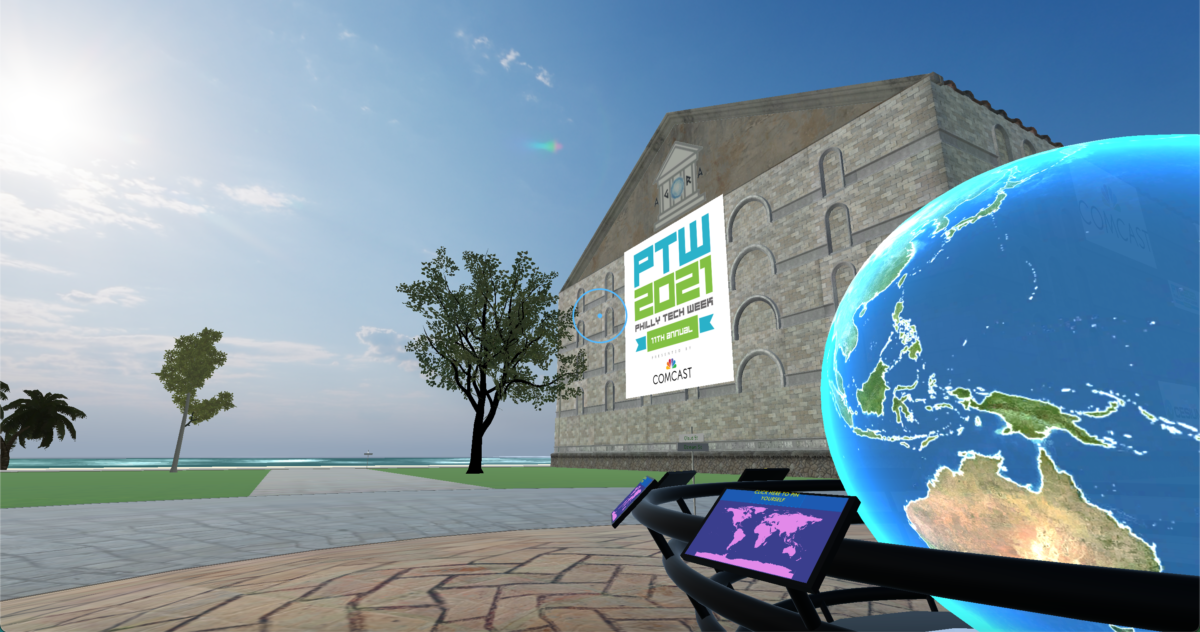When Ethan Berg graduated from Temple University in May 2020, he ran into an issue that many new college graduates have. Staying in touch with friends and classmates can prove difficult as people head their separate ways.
The pandemic only made that more difficult.
“There’s not a lot you can do outside of playing video games or responding to people’s social media posts,” Berg told Technical.ly.
Using his personal savings, Berg decided to build on the idea behind Agora, the company he founded when he was a junior at Temple. Agora initially worked as a way to create a virtual reality shopping mall experience. With ecommerce increasingly becoming a more popular alternative to traditional shopping in brick-and-mortar locations, he felt that creating an interactive online shopping experience could humanize the virtual process.
Instead of only focusing on creating a virtual reality shopping mall experience, Berg worked with his Agora team to pivot to allowing users to create whatever experience they want. Now in the event space in addition to retail, Agora recently hosted Tribaja’s virtual Diversitech Summit and has also held a few art galleries for nonprofits.
The company is also behind a virtual kickoff event for Philly Tech Week 2021 presented by Comcast. The Friday, May 7, event will allow attendees — via avatars — to meet with PTW event organizers, sponsors and each other while perusing the community events calendar in an exhibit hall. Register for free here.
As much as devices like the Oculus and apps like Pokémon Go have become a part of pop culture, Berg has been surprised by the high amount of trepidation clients have about using virtual and augmented reality as a tool.
“One thing that surprises us is that right now, a lot of people we talk to in general feel virtual reality is very foreign,” he said. “It’s very difficult to utilize, whether it’s because of [the need for] headsets or tech. It’s surprising that there’s not a tool for the everyday person.”
Agora’s approach to designing the experiences for clients could potentially remove concerns people have about virtual reality. By using no-code tools, Berg explained, Agora’s clients can customize their own event spaces for up to 15,000 people within Agora’s platform, including by uploading gifs or their own 3D models. (The app itself is built with the Unity engine, custom C# code and Photon networking.)
“Once you hit save, it has a specific location in the 3D world,” he said. “You don’t need to know any coding to utilize it.”
Berg himself has no coding background — though his company does employ developers — and was inspired to create Agora after watching many science fiction movies and wondering why Agora’s services didn’t already exist.
Building a product for people who may not be tech savvy can make it more accessible, he said. And keeping Agora open sourced will allow different developers and design teams to differentiate their own offerings. Berg is hopeful that they can design their own templates as Agora works to make its user interface as easy to navigate as possible.

Ethan Berg. (Courtesy photo)
“Long-term, we want our platform to be the real time-social layer that powers the internet, aka many different apps, websites and immersive online social experiences,” Berg said — in other words, “the Shopify of real-time social apps.”
“We will offer an SDK [software development kit] that allows developers to use our tools to build in the future,” he said. “At first, we are starting closed sourced and will be opening up more and more editing tools for clients as we continue to build and test them to robustness.”
Agora has been available in beta mode since late November 2020, and Berg plans for Agora to formally launch before the end of June. He was also recently onboarded as a mentee for Philadelphia Alliance for Capital and Technologies (PACT) and Ben Franklin Technology Partners‘ Mentor Connect program for founder development. For him and his colleagues, the goal is not to build a platform but to build 3D social environments: “We’re trying to gamify real-world interactions,” he said.
Register for the PTW21 kickoff Michael Butler is a 2020-2022 corps member for Report for America, an initiative of The Groundtruth Project that pairs young journalists with local newsrooms. This position is supported by the Lenfest Institute for Journalism.Join our growing Slack community
Join 5,000 tech professionals and entrepreneurs in our community Slack today!
Donate to the Journalism Fund
Your support powers our independent journalism. Unlike most business-media outlets, we don’t have a paywall. Instead, we count on your personal and organizational contributions.

Comcast introduces ultra-low lag Xfinity internet that boosts experiences with Meta, NVIDIA and Valve

This Week in Jobs: Add these 26 tech career opportunities to your vision board

Enough with the panels and presentations, tech leader says: Philly’s life sciences community can’t thrive without informal meetups


